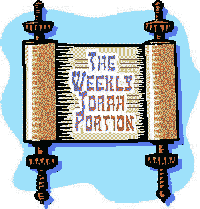Search our Archives:
» Home
» History
» Holidays
» Humor
» Places
» Thought
» Opinion & Society
» Writings
» Customs
» Misc.
|
To Life
By Michael Chessen
At first glance this week's Torah reading, "Chayai Sara", seems to be
misnamed. We are, after all, not dealing with the life of Sara, but her
passing. Up until this point in the Torah's narrative we have dealt
neither with "natural" causes of death nor with bereavement. The Rashi
commentary here somewhat grimly suggests that Sara was the actual "korban"
or sacrificial victim of the Binding of Isaac, dying of shock upon hearing
the account of how her son "almost (was) and wasn't slaughtered". Abraham
subsequently goes about the business of attending to his beloved wife's
burial, the first recorded in the Torah.
Yet this is not an occasion for melancholy. Sara, for her part, had
died after a long and fruitful life. In slightly more modern times, Rabbi
Shimon Bar Yochai's (the author of the mystical book, the "Zohar") departure from this world indicated his having
completed his holy mission, and this gave birth to the joyous minor
holiday of Lag B'Omer. The Midrash suggests a somewhat different parallel,
that which we can draw between the enumeration of Sara's years and the
number of countries over which Queen Esther came to rule. Just as a
hundred and twenty seven countries paid tribute to Esther, this very
number of exemplary years shone in tribute to Sara. The value of Sara in
her spiritual service to humankind dictated that Abraham first eulogize
her, and only then cry for her. The Hebrew word "livkot", "to cry", is
written with a miniaturized letter "kaf", suggesting a lessening of what
might have been our expected measure of weeping. Whether this arose from
Abraham's sense of perspective or merely indicates exercise of restraint,
this lessened weeping stands as an eternal example of the need to limit
mourning according to the stages which our sages have prescribed, and
carry on with the business of life.
For Abraham, well aware that he was due to follow his wife's exit
from this world in the not too distant future, the business of life now
called for ensuring life's very perpetuation by finding a suitable mate
for Isaac. Now whereas the Torah's directive that a man is to leave his
parents in order to "become a single flesh" with his wife had been with us
since Creation, it would seem that until this point in the world's
development, this precept seemed to have occurred as naturally and
effortlessly among people as it did among the lower forms of life.
As the founder of the Jewish people, however, Abraham had a need to
chart "road maps" in order to further his goals. Whereas Isaac in turn
certainly became an unshakable guardian of what could then be seen as the
"Abrahamic" faith, he seemed not to take his own initiatives, save to set
what we now know as our afternoon, "mincha" prayer service. And for all of
Isaac's supposed passivity, it's interesting to note that of the three
daily prayer services, the mincha service is probably that which is
logistically the least "convenient" in the course of day to day life.
In order to find the proper wife for Isaac, Abraham sends his
faithful
servant Eliezer to search among the inhabitants of Abraham's former home
of Haran. Apparently with an eye to compensate for Isaac's fairly inward
personality, Eliezer seeks and finds a young woman whose personality seems
to quite strongly emulate none other than that of Abraham himself.
Wishing you all a Shabbat Shalom !

|
|
Please let us know if you see something unsavory on the Google Ads and we will have them removed. Email us with the offensive URL (www.something.com)
|





|
